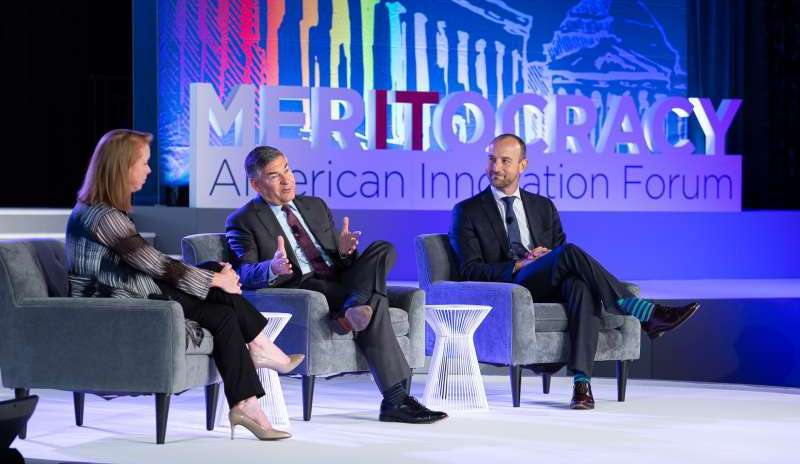
When the Department of Defense’s (DoD) Defense Innovation Unit (DIU) wanted to use artificial intelligence to help military doctors detect cancer, the agency turned to a frequent collaborator: Google Cloud.
The partnership that developed from that effort has served doctors and ailing military veterans alike, senior Google Public Sector and DIU officials said today at the MerITocracy American Innovation Forum.
At a session called Unlocking Technological Innovation via Public-Private Partnerships, Google Public Sector CEO Will Grannis and DIU Director Michael Brown praised the cancer diagnosis project as a model for the public-private partnerships needed to drive innovation in defense and civilian sectors.
“There are technologies— machine learning, AI— for pathology-based diagnostics for cancer treatment,” said Grannis, who last month became CEO of the recently created Google Public Sector separate division. The new entity is focused on bringing cloud technology to U.S. public sector institutions, including Federal, state, and local governments.
“Being able to serve a doctor in the military with recommendations, observations, insights, and assistive technologies, is going to improve care for the military,” Grannis said. “There’s also a net benefit, not just for the Defense Department and the nation as served by security, but also to the nation as served in how healthcare shows up for citizens in our local hospitals.”
Brown hailed the project for employing innovative machine learning tech to help doctors spot cancers they might otherwise have missed. “Several different models were developed for different diseases, different pathologies that were really a tremendous productivity tool,” he said. “We were able to bring that technology that helps so many of our veterans.”
At today’s forum event, Grannis and Brown displayed an easy rapport that underlined their shared private sector backgrounds. Brown became DIU director in 2015 after a career in computing and cybersecurity that included a tenure as CEO of Symantec Corporation.
The pair discussed DIU and Google’s extensive collaboration in cloud security and other projects, including a joint endeavor in which Google provided a cloud environment to host DIU’s immersive training devices for remotely deployed personnel. The system helped the Air Force power flight simulators to train new pilots.
“It’s a very exciting project,” Brown said. “I think it’s a great example of … how to drive innovation across government and hence, across our national space.”
Such public-private partnerships are critical to DIU’s mission. “If we want to drive innovation in the military, that has to be done from outside the traditional defense enterprise,” Brown said. “The technologies we need to modernize, like AI or sight or autonomy, they have been driven by companies in the commercial sector like Google and others. So we have to find a way to work more closely to understand what’s happening out in that world.”
Grannis pointed to the “shared DNA” between Google and DIU to explain their frequent collaboration. “Because we have that kind of similar DNA, a similar language of how we try to develop capabilities quickly delivered to mission users,” he said, “we’re able to jump right in, use similar language and really increase the pace at which we establish the partnership.”
Session moderator Caroline Boyd, a principal in government programs at MeriTalk, wondered how such innovation can be reconciled with the increasingly urgent challenges of cybersecurity. “How do we get better at making sure security doesn’t stymie innovation and the ability for public-private partnerships to flourish?” she asked.
Grannis assured the crowd that Google is firmly committed to both innovation and ensuring that its devices are secure and embody “zero trust principles.”
“There is no line between innovation and security,” he said. “They are intermingled, intertwined, and they’re very complimentary.
